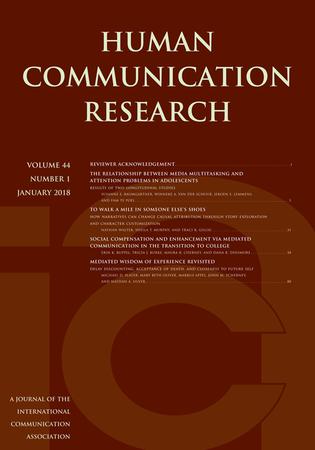Personalization reactance in online medical consultations: effects of two-sided personalization and health topic sensitivity on reactance
IF 4.4
1区 文学
Q1 COMMUNICATION
引用次数: 0
Abstract
Abstract Personalization strategy in commercial contexts has often been criticized for eliciting individuals’ reactance. Will this happen to physician–patient communication in online medical consultations (OMCs)? Two experiments attempted to probe the direct, indirect, and conditional effects of personalization on reactance in OMC. Specifically, perceived threats to freedom and perceived physician caring were examined as two mediators underlying the relationship between personalization and reactance. Health topic sensitivity was investigated as a moderator. Results from both studies revealed that there was no main effect of personalization on reactance, yet personalization induced perceived threats to freedom and perceived physician caring, which affected reactance in a way that might cancel out each other. The effects of personalization (versus depersonalization) on perceived threats to freedom and reactance were more salient at the lower level of health topic sensitivity. These suggest that personalization with its two-sided nature exerts both desired and undesired influences and health topic sensitivity can be a prominent contextual factor in personalization reactance during OMC.在线医疗咨询中的个性化阻抗:双向个性化和健康话题敏感性对阻抗的影响
商业情境下的个性化策略常因引起个体的抗拒而受到批评。这种情况会发生在在线医疗咨询(omc)的医患沟通中吗?两个实验试图探讨个性化对OMC中电抗的直接、间接和条件影响。具体地说,对自由的感知威胁和对医生关怀的感知被检验为个性化和抗拒之间关系的两个中介。健康话题敏感性作为调节因素进行了研究。两项研究的结果都表明,个性化对抗拒没有主要影响,但个性化引起了对自由的感知威胁和对医生关怀的感知,它们以一种可能相互抵消的方式影响抗拒。在较低的健康主题敏感性水平上,个人化(相对于去个人化)对感知到的对自由的威胁和抗拒的影响更为显著。这些结果表明,具有两面性的个性化会产生期望和不希望的影响,健康话题敏感性可能是OMC期间个性化抗拒的重要背景因素。
本文章由计算机程序翻译,如有差异,请以英文原文为准。
求助全文
约1分钟内获得全文
求助全文
来源期刊

Human Communication Research
COMMUNICATION-
CiteScore
8.20
自引率
2.00%
发文量
28
期刊介绍:
Human Communication Research is one of the official journals of the prestigious International Communication Association and concentrates on presenting the best empirical work in the area of human communication. It is a top-ranked communication studies journal and one of the top ten journals in the field of human communication. Major topic areas for the journal include language and social interaction, nonverbal communication, interpersonal communication, organizational communication and new technologies, mass communication, health communication, intercultural communication, and developmental issues in communication.
 求助内容:
求助内容: 应助结果提醒方式:
应助结果提醒方式:


